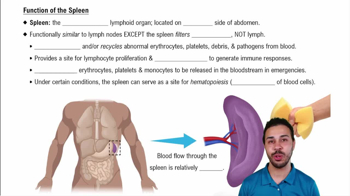Multiple Choice
The lymphoid organ(s) located in the throat that defend(s) against invading bacteria coming in through the mouth and nose is/are __________.
1099
views
3
rank
 Verified step by step guidance
Verified step by step guidance Verified video answer for a similar problem:
Verified video answer for a similar problem:



 7:11m
7:11mMaster Function of the Spleen with a bite sized video explanation from Bruce Bryan
Start learning